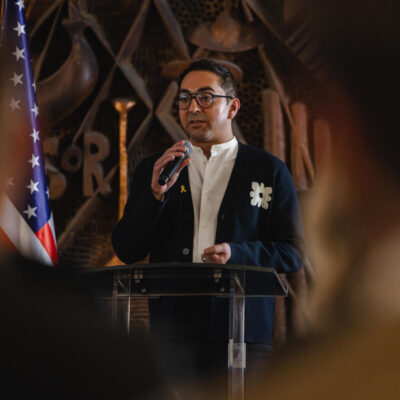
courtesy
The Washington doctors helping women navigate breast cancer
Dr. Rachel Brem and Dr. Christy Teal’s new book, 'No Longer Radical: Understanding Mastectomies and Choosing the Breast Cancer Care That's Right for You,' aims to help women understand their options
One in eight American women are diagnosed with breast cancer in their lifetime.
That ominous fact opens Dr. Rachel Brem and Dr. Christy Teal’s new book, No Longer Radical: Understanding Mastectomies and Choosing the Breast Cancer Care That’s Right for You. Despite the disheartening statistic, Brem and Teal’s 307-page guide to all things breast cancer was not meant to evoke fear. Rather, it’s a resource to help women understand all of their options as they navigate an incredibly difficult time in their life.
An internationally renowned breast cancer expert, Brem is the director of breast imaging and intervention as well as a professor and vice chair of radiology at The George Washington University School of Medicine and Health Sciences; she is also the founder and chief medical advisor of the nonprofit Brem Foundation to Defeat Breast Cancer. Teal is chief of breast surgery at GW and director of the university’s Breast Care Center, as well as an associate professor of surgery. The two also have personal histories with breast cancer themselves.
“When I saw my ultrasound, I knew what it was,” Brem, 64, told Jewish Insider last month ahead of the book’s launch. In a twist of fate, Brem discovered her own breast cancer while testing new ultrasound equipment at the hospital. “My emotional response to that was, I feel so sorry for all the women who are in these shoes, you know, [who] find out they have breast cancer and don’t have the vast experience and intricate knowledge of the literature that I do. So [No Longer Radical] was written to try to fill that void.”
Most diseases have a clear-cut treatment path once a diagnosis is made, but breast cancer requires much more involvement from the patient, a task that can feel daunting to many.
“There are very few things in medicine that require the patient to make so many critical decisions,” Brem said. “The right decision for every woman is different, and they’re all correct decisions as long as they’re made armed with the information that they need to really be able to make the best [decision] for themselves.”

Decisions such as whether or not to get a mastectomy, which type, or opting instead for a lumpectomy or other treatment, are all explored at length in the book. Yet, the duo makes clear they are not trying to push readers into a specific course of care.
“We’re not pro-mastectomy. We are pro-educating and telling patients what their options are, and just having a conversation and a discussion. Ultimately, it should be the patient’s choice,” Teal, 56, told JI.
The book also tackles annual and high-risk screenings, the many types and stages of breast cancer — one chapter dives deep into pathology and treatment — what to know if you’re diagnosed at an early age or post-menopause, BRCA mutations and genetic predispositions, dating after surgery, women with dense breasts, and a number of other possible concerns.
“I think that women are either afraid to ask [about their options], or if they’re asking, then they’re often being told no,” Teal said, an experience she dealt with firsthand from colleagues after deciding to undergo her own prophylactic double mastectomy in 2011 at 44.
Teal’s decision came from watching her mother, Nancy Brown, battle breast cancer for nearly two decades. Brown was first diagnosed at age 60 in 1997 — within a month of Teal’s best friend — with what Teal described in the book as a somewhat “easy” cancer. A lumpectomy, sentinel lymph node biopsy and radiation, followed by five years of tamoxifen, allowed her to live cancer-free for 13 years before the discovery of a new lump in 2010 sent her back to the examination room. Brown’s new cancer, which Brem ended up diagnosing, was much more aggressive; originating in the opposite breast from her first bout, it had spread to nearby lymph nodes and required more involved procedures, driving Teal to consider her own preemptive measures so as to avoid similar issues in the future.
Despite seemingly no genetic predisposition — multiple tests by Brown had come back negative — Teal was happy with her decision to get preventive mastectomies, though certain colleagues insisted the procedure was only necessary for women with known genetic mutations.
“I had a lot of conversations with my mom about the fact she knew that she would end up dying from breast cancer. She was hoping that we would be able to keep her alive until she was in her 80s,” Teal recalled. “And she almost made it to 80. She was 79 when she ended up dying from breast cancer [in 2016]. So when that all went on, when she had her recurrence, I really, truly just felt relief that I didn’t have to worry about getting breast cancer.”

Brem’s personal journey also began with her mother. When Brem was 12, her mother, Lea Frydman, only 33 at the time, was diagnosed with breast cancer and given just six months to live. It was in that moment that Brem, who had always known she wanted to be a doctor, chose to dedicate her life to the disease. Frydman ended up living for another 44 years, despite a lengthy battle with ovarian cancer that started after over a decade in remission from her initial diagnosis. In her early years, the BRCA genetic mutation hadn’t been discovered yet, so it wasn’t until 1996, when Brem was 37 and her maternal aunt had recently been diagnosed with breast cancer, that she decided to get tested. Her results came back positive for the mutation.
Timing is everything, Brem said of choosing the right preventative care, but, like what happened to her two weeks before her prophylactic double mastectomy was set to take place, “cancer knows no time,” and even the most carefully laid out plans can be upended if the cancer presents earlier than expected.
“Ninety-five percent of early breast cancers are cured, or at least women live more than five years, but a very high cure rate. But you have to find early cancer to have a curable cancer,” Brem said. “The consequence of early screening and improved therapy is that the death rate from breast cancer has gone down by 40% over the past two decades.”
Neither Brem nor Teal believe that otherwise healthy women with no family history need to go through extensive screenings beyond what is generally suggested, but they strongly advise annual mammograms for those 40 and over, and for those who are at higher risk or have a genetic predisposition, they stress the importance of early detection.
Ashkenazi Jews, for example, are considered a high-risk group for BRCA gene mutations, with the gene being found 10 times more often in Ashkenazim than the general population, as cited in the book. “I would recommend every woman of Ashkenazi heritage who has any family history of breast or ovarian cancer do genetic testing,” Teal said.
Ashkenazi men are also at a higher risk. Whereas only one in 833 men will develop breast cancer in their lifetime, according to the Breast Cancer Research Foundation, rates in Ashkenazi men are much higher.
“For men who have the BRCA2 mutation, the risk of breast cancer is similar to the average American woman, which is 12%, or one in eight, and so we now talk about screening Ashkenazi Jewish men who have the BRCA2 mutation,” Brem said. “We don’t cover it in the book, but men who have the BRCA mutation, whether it’s 1 or 2 or other mutations, often have a markedly increased risk of prostate cancer, and [it] occurs at a younger age.”
From women to men to the loved ones standing beside them — who are also the focus of the book’s penultimate chapter — No Longer Radical is a resource for everyone.
“We love what we do on the one-to-one, we love taking care of patients. It’s incredibly gratifying,” Brem said. “But this is an opportunity to take care of people, men and women, on a much larger scale where we can reach more people and have an impact beyond our practice.”
(Disclosure: Dr. Rachel Brem is the mother of Jewish Insider’s chief operating officer, Andrea Wolf.)






